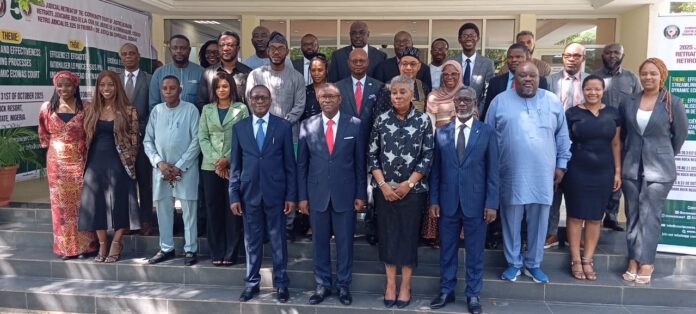Participants at the ECOWAS Court’s Judicial Retreat held at the Zuma Rock Resort, Abuja, on Monday.(NAN)
By Mark Longyen
The ECOWAS Court has called for stronger collaboration between its College of Judges and support staff to enhance shared commitment to excellence, professionalism, integrity and effective justice delivery.
Justice Ricardo Gonçalves, the Court’s President, stated this at the court’s 2025 Judicial Retreat with the theme, “Efficiency and Effectiveness: Streamlining Processes for a Dynamic ECOWAS Court,” in Abuja on Monday.
He explained that, going forward, efforts would be put in place to strengthen the synergy between judges and staff members because there is not supposed to be division of powers between them.
“Every staff member, regardless of grade or function, is here to support the judges in the performance of their duties.
“This is the sole and fundamental purpose underlying the creation of a staff structure within which the Department Directors play a key role.
“This applies to all staff, whether inside or outside the organisational chart; whether general service or support staff; professional staff; and especially senior officials in managerial positions,” he said.
According to the Court’s President, the authority of the judges, as guardians of the court’s judicial mandate, must never be undermined by administrative attitudes or personal considerations.
Justice Gonçalves stressed that collaboration must not be a matter of choice but rather a duty of office and a moral obligation.
He warned that no staff member should fall into the temptation of assuming that, by virtue of their position, they hold greater responsibilities or more legitimate concerns than the judges.
“This is regarding the interpretation, application and assessment of community legal texts, or regarding the responsible management of human and financial resources.
“These responsibilities, by law, lie exclusively with the College of Judges and the Court’s leadership, respectively,” he further said.
The Community Court President noted that so far the expected level of collaboration has not always met the required standards, and called for swift changes and concrete improvements.
He warned that the court’s leadership would henceforth not hesitate to apply the relevant provisions of the Staff Regulations to ensure discipline and accountability at all levels.
“In this regard, a Disciplinary Procedure Manual has been prepared. It will be presented and discussed during this retreat. This document is not a threat to anyone.
“Rather, it is an instrument of justice and transparency designed to ensure that discipline is exercised fairly and that every member of staff understands both their rights and their responsibilities.
“As we begin our deliberations, let us reaffirm our shared commitment to excellence, professionalism and integrity.
“From this retreat, we must emerge with clear resolutions that will guide our work in the coming year,” he said.
Justice Gonçalves further said that the retreat was not only a moment of reflection, but also a forum for the renewal of commitment, discipline and integrity in the service of justice.
He described the retreat it as a forum where the judges would review the functioning of the court’s departments and examine their various contributions to the work and activities of the institution.
The Court’s President said the judges would also assess the quality of collaboration received from the court’s departments, which exist to support the judges in their noble task of administering justice.
“We will also conduct a more detailed review of the implementation status of the recommendations adopted in previous retreats, as these recommendations cannot be merely symbolic declarations,” he added.
Speaking earlier, Dr Yaouza Ouro-Sama, the Court’s Chief Registrar, said the retreat aimed to reinforce the capacity of staff to effectively support the judges’ job, improve their efficiency, productivity, and synergy.
He said that the theme of the retreat was thoughtfully chosen to underscore the imperative of enhancing staff efficiency and productivity in the discharge of their official duties.
“The overarching objective is to establish clear, actionable guidelines for the various departments and divisions of the Court, with the aim of adopting best practices that promote institutional effectiveness.
“This retreat also provides an opportunity to critically assess the Court’s internal operations and its capacity to deliver justice in a timely and responsive manner,” he said.(NAN)







